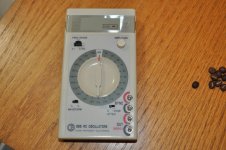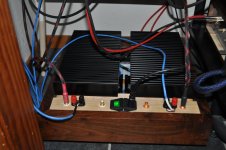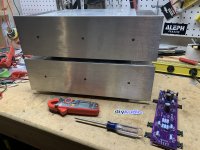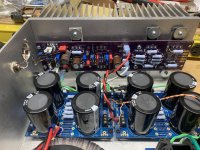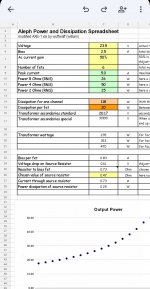mkane77g - I strongly suggest reading the build docs from back to front a few times. They're exceptional, IMO. In addition to above, it shows the values in the BoM.
If you're really needing to know "how" to center them vs. the values - simply count the turns from 'click to click'
OR
if you're really picky, you can equalize the resistance between pins 1 and 2 vs. 2 and 3 before installing them.
Either would likely work very well for P1 and P2.
For P3, you may or may not want the 50k pot 'centered', but the initial setting value is given if needed and you're being choosy. I'll probably just leave it centered.
If you're really needing to know "how" to center them vs. the values - simply count the turns from 'click to click'
OR
if you're really picky, you can equalize the resistance between pins 1 and 2 vs. 2 and 3 before installing them.
Either would likely work very well for P1 and P2.
For P3, you may or may not want the 50k pot 'centered', but the initial setting value is given if needed and you're being choosy. I'll probably just leave it centered.
If you're really needing to know "how" to center them vs. the values - simply count the turns from 'click to click'
OR
if you're really picky, you can equalize the resistance between pins 1 and 2 vs. 2 and 3 before installing them.
This point may not be crystal clear in the document. To properly set the value
- Find the little white line between the center / wiper pin holes and the "outer" pin holes. There is only one white line per pot.
- BEFORE INSTALLING THE POT: Adjust the resistance of the pot between the center / wiper pin and the pin that will go into the hole at the other side of that white line to match the value in the build doc.
If you set the values based on the build guide you'll have the same settings from the Pass service manuals. "Stock settings". If you want to play with the gain, bias, and offet, you can use the pots. Or you can simply "set and forget"
If you look at this picture you can see the white line between the center / wiper pin holes and the trace for othe side of P2. Note the 3rd pin is tied to the wiper, you can see the trace in the picture.
I've read the build doc quite a few times and I'll read em' some more.
▀BEFORE INSTALLING THE POT-this sinks in thanks.
▀BEFORE INSTALLING THE POT-this sinks in thanks.
Last edited:
Randy - Agreed. He asked how to center them vs. set to the value given, (and two of them are awfully close). Your instructions for setting to the value precisely are on point, as always.
The gain setting procedures got me also. Driving a sine wave into a load?
I haven't personally done this yet. The jumper was included to play with this setting, but it wasn't on my prototype.
Option 1 - set pot and forget, it was the value picked by Papa in the original design
Option 2 - pull the jumper, adjust per the post below and report back.
It's a bit confusing, I think it might make sense while playing around with it on the bench.
See this thread for more info.
https://www.diyaudio.com/forums/pass-labs/38033-proper-current-source-adjustment.html
A portion of what matters is if the source can deliver the voltage required.
mkane77g - check the specs for your unit. Read the referenced process. Can it put out 16vrms / the V/V gain of the amp? If not... do you want to feed it into a pre-amp or other source for some added voltage gain?
toadroller - YouTube vids can be fine for a signal, but what's providing the voltage output? 😀 My computer won't put out enough voltage to drive an Aleph 30 to 16Vrms (as an example). You may also want to note the frequency... 1000Hz is about 10x above what's mentioned. Some AC VM may not latch to 1kHz. If you're using a scope vs. a "cheap AC Voltmeter" as mentioned, then roll on Toad. 😀
Randy mentioned that he's not even done this process yet... and he's a FAB (He works on Rawsons!) Do you want to do all that extra measurement 'stuff', or just set it and forget it using the target value?
Randy - all fun stuff aside. I do think that adding the word 'current' into the description is appropriate. The full bit is the AC Current Gain for the Aleph Current Source, but that's a chunk o' words. However, 'AC gain' alone could be possibly be misinterpreted as the V/V gain of the amp. When I read post #65... I wondered what was being asked.
It's late... I could have it all off.
mkane77g - check the specs for your unit. Read the referenced process. Can it put out 16vrms / the V/V gain of the amp? If not... do you want to feed it into a pre-amp or other source for some added voltage gain?
toadroller - YouTube vids can be fine for a signal, but what's providing the voltage output? 😀 My computer won't put out enough voltage to drive an Aleph 30 to 16Vrms (as an example). You may also want to note the frequency... 1000Hz is about 10x above what's mentioned. Some AC VM may not latch to 1kHz. If you're using a scope vs. a "cheap AC Voltmeter" as mentioned, then roll on Toad. 😀
Randy mentioned that he's not even done this process yet... and he's a FAB (He works on Rawsons!) Do you want to do all that extra measurement 'stuff', or just set it and forget it using the target value?
Randy - all fun stuff aside. I do think that adding the word 'current' into the description is appropriate. The full bit is the AC Current Gain for the Aleph Current Source, but that's a chunk o' words. However, 'AC gain' alone could be possibly be misinterpreted as the V/V gain of the amp. When I read post #65... I wondered what was being asked.
It's late... I could have it all off.

^^source, my phono stage pre-amp. It runs on +-15v. It's a DIY unit so I'll relive that build thread and see if I can find out what the v/v gain is.
I should probably just set it and forget it, but I like the challenge. Always learning @ 69.
This is our Aleph J. I'll pull these heatsinks and install new ones with the 30s. It runs 50-55° C weather-dependent.
I should probably just set it and forget it, but I like the challenge. Always learning @ 69.
This is our Aleph J. I'll pull these heatsinks and install new ones with the 30s. It runs 50-55° C weather-dependent.
Attachments
My prototype boards have been swapped for GB boards in Aleph 30 mono block configuration. They sounded great on the bench. Now it’s time to put them on JBL 4410 monitors.
Attachments
Nice! Is there a reason you skipped Q7 specifically?
Not really. I need 3 of the 4 per side of the board populated. On my prototypes I tried Q7 on one board, and skipped it on the other. Makes no difference.
@rhthatcher Randy in the Aleph30 stereo build notes you state "the 4U Deluxe Case is a perfect candidate".
Did you refer to the 4U 300 Case? Are two heatsinks with 0,31 K/W enough for an Aleph 30 Stereo build? After reading other statements like from @Zen Mod I would go for a 5U 400 Case (will get me in trouble with my gf..)
I am all new to the Aleph topology. What is the total bias current for one channel when i build my Aleph as proposed in the Aleph30 build notes?
Can I use the "Aleph Power calculation" spreadsheet created by @wuffwaff for this project to do thermal calculations for certain bias points?
Did you refer to the 4U 300 Case? Are two heatsinks with 0,31 K/W enough for an Aleph 30 Stereo build? After reading other statements like from @Zen Mod I would go for a 5U 400 Case (will get me in trouble with my gf..)
I am all new to the Aleph topology. What is the total bias current for one channel when i build my Aleph as proposed in the Aleph30 build notes?
Can I use the "Aleph Power calculation" spreadsheet created by @wuffwaff for this project to do thermal calculations for certain bias points?
Attachments
Love it! Aleph 30 owner's manual is a great source of information. I always enjoy reading a manual for a Pass product. The descriptions around the toplogies and what makes the amp 'special' are wonderful, IMO.^^source, my phono stage pre-amp. It runs on +-15v. It's a DIY unit so I'll relive that build thread and see if I can find out what the v/v gain is.
I should probably just set it and forget it, but I like the challenge. Always learning @ 69.
Fantastic! I love parts delivery day. Have you got a set of load resistors? They'll be needed for setting the AC current gain for the current source? If you don't have them, you can grab some off of Amazon (or any other quick source) if you're in a hurry.Tracker says my parts are waiting for pick-up
Looking forward to your build. Living vicariously through others until I can get started.
I do have a box or resistors, but I haven't checked what values they are. I won't order anything from amazon but there's an electronics store 1-1/2 hrs away. I do like road trips and it's a fun place to go. They have all sorts of stuff.
I'll have this soldered up by Tuesday. Can't touch it until Monday. Wife stuff to do.
I'll have this soldered up by Tuesday. Can't touch it until Monday. Wife stuff to do.
Lookin at the values I may need, 150r/392r/30k I can come close, not exact.
Edit; looks like a road trip is in order. I only have 30k resistors. I'll pick up a few more items while I'm there.
Edit; looks like a road trip is in order. I only have 30k resistors. I'll pick up a few more items while I'm there.
Last edited:
- Home
- Amplifiers
- Pass Labs
- Classic Aleph Amplifier for Modern UMS Chassis Builder's Thread
